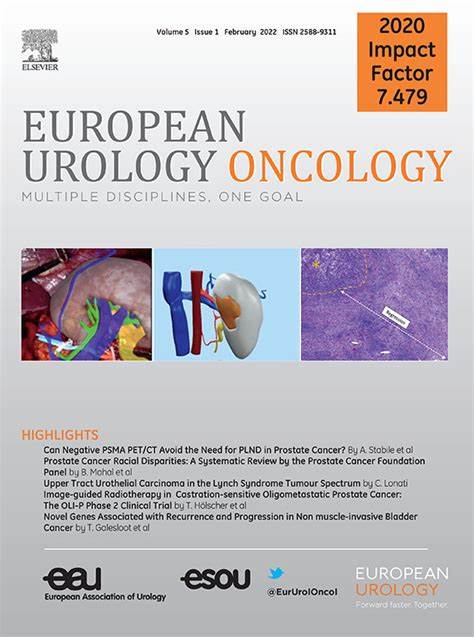非肌层浸润性膀胱癌的性别差异:基于人口的大型数据集的陷阱与综合分析的启示》。
IF 9.3
1区 医学
Q1 ONCOLOGY
引用次数: 0
摘要
性别对非肌层浸润性膀胱癌(NMIBC)的影响仍不确定,目前的证据也相互矛盾。为了解决这一不确定性,我们利用监测、流行病学和最终结果(SEER)--医疗保险和UROMOL数据集进行了一项综合分析,以探讨非肌层浸润性膀胱癌肿瘤结局的性别差异。在SEER-Medicare队列中,女性的复发和进展风险低于男性,但在BC特异性死亡率方面未观察到显著差异。对UROMOL队列的分析表明,在基因组、转录组和空间蛋白质组领域,肿瘤生物学没有性别差异。这些发现凸显了仅依靠 SEER-Medicare 数据来确定 NMIBC 的局限性,因为确定复发和进展的真实发生率具有挑战性,这些发现还强调了结合基于人群的数据和分子生物学结果来全面了解 NMIBC 的重要性。患者摘要:性别对非肌层浸润性膀胱癌(NMIBC)预后的影响尚不清楚。我们对基于人群的大型数据集进行的分析表明,女性的复发和恶化风险较低。然而,对另一个分子数据集的分析表明,没有性别差异。这些结果凸显了将基于人群的数据与分子生物学结果相结合以更好地了解 NMIBC 的重要性。本文章由计算机程序翻译,如有差异,请以英文原文为准。
Sex Disparity in Non–muscle-invasive Bladder Cancer: Pitfalls of Large Population-based Data Sets and Lessons from an Integrated Analysis
The impact of sex on non–muscle-invasive bladder cancer (NMIBC) remains uncertain and current evidence is conflicting. To address this uncertainty, we conducted an integrative analysis using Surveillance, Epidemiology and End Results (SEER)-Medicare and UROMOL data sets to explore sex disparities in NMIBC oncological outcomes. In the SEER-Medicare cohort, females had lower risks of recurrence and progression in comparison to males, but no significant difference in BC-specific mortality was observed. Analysis of the UROMOL cohort revealed no sex-specific differences in tumour biology across genomic, transcriptomic, and spatial proteomic domains. These findings highlight the limitations of relying on just SEER-Medicare data for NMIBC, for which identification of the true incidence of recurrence and progression is challenging, and emphasise the importance of combining population-based data and molecular biology results to gain a comprehensive understanding of NMIBC.
Patient summary
The impact of sex on non–muscle-invasive bladder cancer (NMIBC) outcomes is unclear. Our analysis of a large population-based data set showed that the risks of recurrence and progression were lower for females. However, analysis of a separate molecular dataset showed no sex-specific differences. The results highlight the importance of combining population-based data and molecular biology results for a better understanding of NMIBC.
求助全文
通过发布文献求助,成功后即可免费获取论文全文。
去求助
来源期刊

European urology oncology
Multiple-
CiteScore
15.50
自引率
2.40%
发文量
128
审稿时长
20 days
期刊介绍:
Journal Name: European Urology Oncology
Affiliation: Official Journal of the European Association of Urology
Focus:
First official publication of the EAU fully devoted to the study of genitourinary malignancies
Aims to deliver high-quality research
Content:
Includes original articles, opinion piece editorials, and invited reviews
Covers clinical, basic, and translational research
Publication Frequency: Six times a year in electronic format
 求助内容:
求助内容: 应助结果提醒方式:
应助结果提醒方式:


